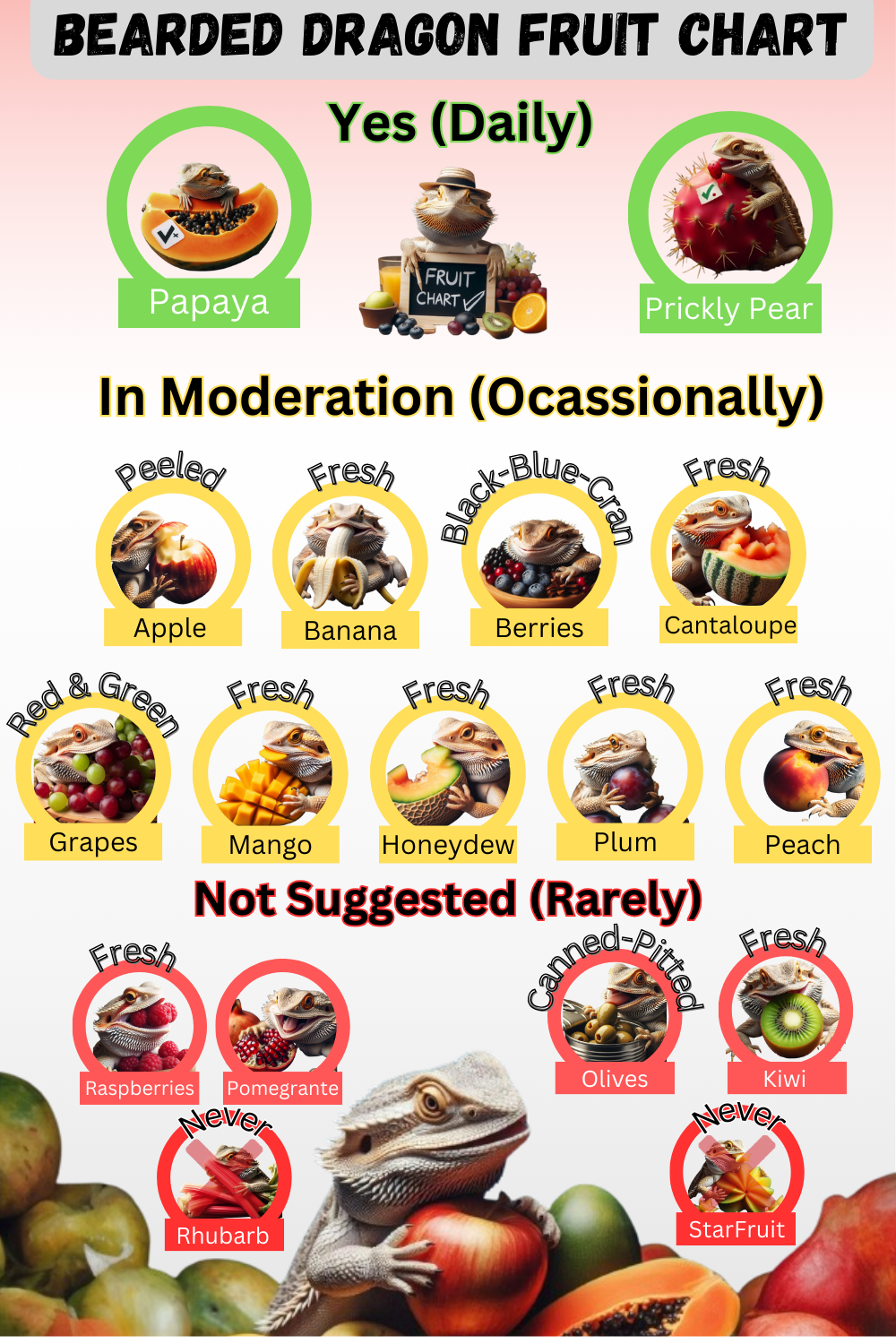This guide is intended to provide information on the most searched query “bearded dragon fruit chart”. It is not a substitute for professional guidance or veterinary advice. Generally, the amount of fruit in their diet should be limited to an occasional/rare treat. We often advise sticking with veggies only, as fruit may harm your pet. Here, you can learn 3 reasons why bearded dragons shouldn’t eat fruits. Please consult a qualified veterinarian for specific concerns or questions regarding your pet’s diet and health.
Bearded Dragon Fruit Chart

30+ Safe Fruits For Bearded Dragons
| Safe Fruits For Bearded Dragons | Frequency | Protein | Fiber | Sugar | Fat | Water | Ca:P | Oxalates |
| Apple (peeled) | Occasionally | 0.20% | 1.90% | 11.50% | 0.20% | 85% | 1:1.8 | Low |
| Apricot (fresh) | Occasionally | 1.40% | 2.40% | 9.30% | 0.40% | 86% | 1:1.4 | Moderate |
| Banana | Occasionally | 1.00% | 2.40% | 18.40% | 0.50% | 74% | 1:3.3 | Low |
| Blackberries (fresh) | Occasionally | 0.70% | 5.30% | 7.90% | 0.40% | 86% | 1.5:1 | Moderate |
| Blueberries (fresh) | Occasionally | 0.70% | 2.70% | 7.30% | 0.40% | 85% | 1:1.6 | Moderate |
| Cactus Pear (Prickly Pear) | Daily | 0.70% | 3.60% | 0.50% | 88% | 2.3:1 | Low | |
| Cantaloupe (fresh) | Occasionally | 0.90% | 0.80% | 8% | 0.30% | 90% | 1:1.5 | Low |
| Cherries | Occasionally | 1.10% | 2.10% | 12.80% | 0.20% | 82% | 1:1 | Low |
| Cranberries (fresh) | Occasionally | 0.40% | 4.20% | 0.20% | 87% | 1:1.3 | Moderate | |
| Figs (raw) | Occasionally | 0.80% | 3.30% | 6.90% | 0.30% | 79% | 2.5:1 | Moderate |
| Grapefruit (fresh) | Occasionally | 0.60% | 0% | 6.20% | 0.10% | 91% | 1.2:1 | Moderate |
| Grapes (red & green) | Occasionally | 0.60% | 1.00% | 16% | 0.40% | 81% | 1.4:1 | Moderate |
| Guava | Occasionally | 0.80% | 5.40% | 6% | 0.60% | 86% | 1:1.3 | Moderate |
| Honeydew (fresh) | Occasionally | 0.50% | 0.60% | 0.10% | 90% | 1:1.7 | Low | |
| Kiwi (fresh) | Rarely | 1.00% | 3.40% | 9% | 0.40% | 83% | 1:1.5 | High |
| Mango (fresh) | Occasionally | 0.50% | 1.80% | 14.80% | 0.30% | 82% | 1:1 | Moderate |
| Nectarine | Occasionally | 0.90% | 1.60% | 8.50% | 0.50% | 86% | 1:3 | Low |
| Olives (canned, pitted) | Rarely | 0.80% | 3.20% | 10.70% | 80% | 29:1 | High | |
| Orange, Mandarin | Occasionally | 0.60% | 2.30% | 0.20% | 88% | 1.4:1 | Moderate | |
| Orange, Navel | Occasionally | 1.00% | 2.40% | 8.90% | 0.10% | 87% | 2:1 | Moderate |
| Papaya (fresh) | Daily | 0.60% | 1.80% | 5.90% | 0.10% | 89% | 5:1 | Low |
| Peach (fresh) | Occasionally | 0.70% | 2.00% | 8.70% | 0.10% | 88% | 1:2.4 | Low |
| Pear (fresh) | Occasionally | 0.40% | 2.40% | 10.50% | 0.40% | 84% | 1:1 | High |
| Pear, Asian (fresh) | Occasionally | 0.50% | 3.60% | 0.20% | 88% | 1:2.8 | High | |
| Pineapple (canned) | Occasionally | 0.40% | 0.80% | 0.10% | 86% | 2:1 | Moderate | |
| Pineapple (fresh) | Occasionally | 0.40% | 1.20% | 12% | 0.40% | 87% | 1:1 | Moderate |
| Plum (fresh) | Occasionally | 0.80% | 1.50% | 7.50% | 0.60% | 85% | 1:2.5 | Low |
| Pomegranate | Rarely | 1.00% | 0.60% | 9% | 0.30% | 81% | 1:2.7 | Moderate |
| Prunes (canned) | Occasionally | 0.90% | 3.80% | 0.20% | 71% | 1:1.5 | Moderate | |
| Raspberries (fresh) | Rarely | 0.90% | 6.80% | 0.60% | 87% | 1:1.2 | Moderate | |
| Rhubarb | Never | 0.90% | 1.80% | 0.90% | 0.20% | 94% | 6:1 | High |
| Raisins (seedless) | Occasionally | 3.20% | 4.00% | 62% | 0.50% | 15% | 1:2 | Low |
| Starfruit (Carambola) | Never | 0.50% | 2.70% | 7.10% | 0.40% | 91% | 1:4 | High |
| Strawberries (fresh) | Occasionally | 0.60% | 2.30% | 5.70% | 0.40% | 92% | 1:1.4 | Moderate |
| Watermelon | Occasionally | 0.60% | 0.50% | 0.40% | 0.40% | 95% | 1:1 | Low |
Portion Sizes
Alright, so let’s talk about how much fruit you should be feeding your bearded dragon. Moderation is really important here.
- Moderation is Key: Fruits should make up only a small portion of a bearded dragon’s diet, typically around 10-15% of their total food intake.
- Small Pieces: Cut fruits into small, manageable pieces to prevent choking and make it easier for your dragon to eat.
- Frequency: Offer fruits as a treat once or twice a week. This ensures they enjoy the benefits without overloading on sugar.
Preparation Tips
When it comes to feeding fruits to your bearded dragon, proper preparation is crucial for several reasons.
- Wash Thoroughly: Always wash fruits to remove any pesticides or chemicals.
- Peel and Remove Seeds: Remove any seeds, pits, or tough skins to prevent choking hazards and digestive issues.
- Freshness: Serve fresh fruits rather than dried or canned ones, which can contain added sugars and preservatives.
Potential Health Risks
High Sugar Content
One of the main risks of feeding too much fruit is the high sugar content. Too much sugar can lead to weight gain, tooth decay and even diabetes in bearded dragons. So, keeping fruit as a rare treat is really important.
Oxalates & Goitrogens
Some fruits contain oxalates, which can bind to calcium and reduce its absorption. This can lead to metabolic bone disease. Goitrogens can interfere with thyroid function, affecting your dragon’s metabolism and growth. Again, variety and moderation help manage these risks.
Other Risks
Overfeeding fruits can also cause digestive issues like diarrhea, thanks to their high water content and fiber. And remember, some fruits like avocados and rhubarb are toxic to bearded dragons and should be avoided completely.
3 Common Signs of Overfeeding Fruits
Diarrhea
Frequent, loose stools can indicate that your bearded dragon is consuming too much fruit.
Weight Gain
Regularly check your dragon’s weight; rapid or excessive weight gain is a sign of overfeeding
Lethargy
If your dragon appears less active than usual, it could be a sign of dietary imbalance.
Consult a Veterinarian
Regular Check-Ups
Schedule regular veterinary visits to monitor your bearded dragon’s overall health and diet.
Tailored Advice
A reptile veterinarian can provide specific dietary recommendations based on your dragon’s individual needs.
